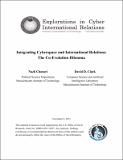| dc.contributor.author | Choucri, Nazli | |
| dc.contributor.author | Clark, David D | |
| dc.date.accessioned | 2022-04-07T17:24:36Z | |
| dc.date.available | 2022-04-07T17:24:36Z | |
| dc.date.issued | 2012-11-06 | |
| dc.identifier.uri | https://hdl.handle.net/1721.1/141757 | |
| dc.description.abstract | Cyberspace is a fact of daily life. Until recently cyberspace was considered largely a matter of low politics – the term used to denote background conditions and routine decisions and processes. By contrast high politics is about national security, core institutions, and decision systems that are critical to the state, its interests, and its underlying values. We now see cyberspace shaping the domain of high politics, and high politics shaping the future of cyberspace. The field of international relations, rooted in 20th century issues and theories, has not kept pace with the emerging significance of cyberspace.
This paper addresses what we call the co-evolution dilemma: as cyberspace and international politics now start to shape each other, we have few conceptual anchors to fully identify, let alone model, the potential collision of law, policy and practice in the cyber arena with shared norms, common practices, and modes of interactions in international relations that have evolved over time. At a minimum, we need to develop a map of the joint domain of cyberspace and international relations.
Our purpose here is to (1) develop an alignment strategy to connect the Internet, the core of cyberspace, and international relations (2) introduce the control point analysis, a method we have developed to explicate dynamics among cyber-actors, in terms of their relative power and influence, and (3) highlight critical co-evolution parameters embedded in the fabric of world politics. | en_US |
| dc.description.sponsorship | This material is based on work supported by the U.S. Office of Naval Research, Grant No. N00014-09-1-0597. Any opinions, findings, conclusions or recommendations therein are those of the author(s) and do not necessarily reflect the views of the Office of Naval Research. | en_US |
| dc.language.iso | en_US | en_US |
| dc.publisher | © Massachusetts Institute of Technology | en_US |
| dc.relation.ispartofseries | ECIR Working Paper No. 2012-3 | |
| dc.rights | Attribution-NonCommercial-NoDerivs 3.0 United States | * |
| dc.rights.uri | http://creativecommons.org/licenses/by-nc-nd/3.0/us/ | * |
| dc.title | Integrating cyberspace and international relations: The co-evolution dilemma | en_US |
| dc.type | Working Paper | en_US |
| dc.identifier.citation | Choucri, N., & Clark, D. D. (2012). Integrating cyberspace and international relations: The co-evolution dilemma (ECIR Working Paper No. 2012-3). MIT Political Science Department. | en_US |
| dc.eprint.version | Author's final manuscript. | en_US |
